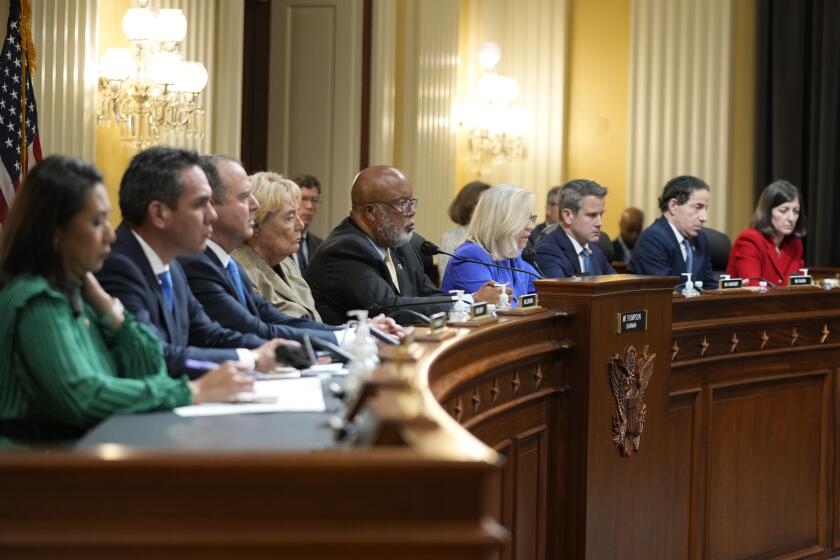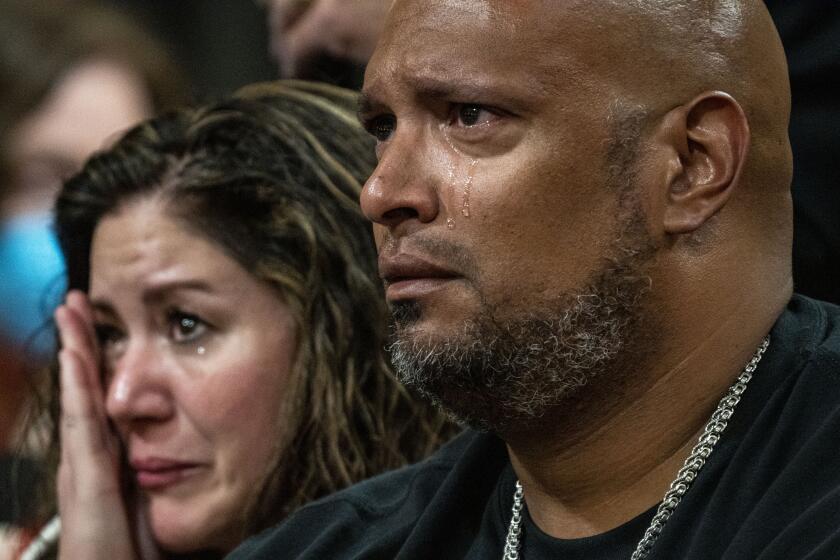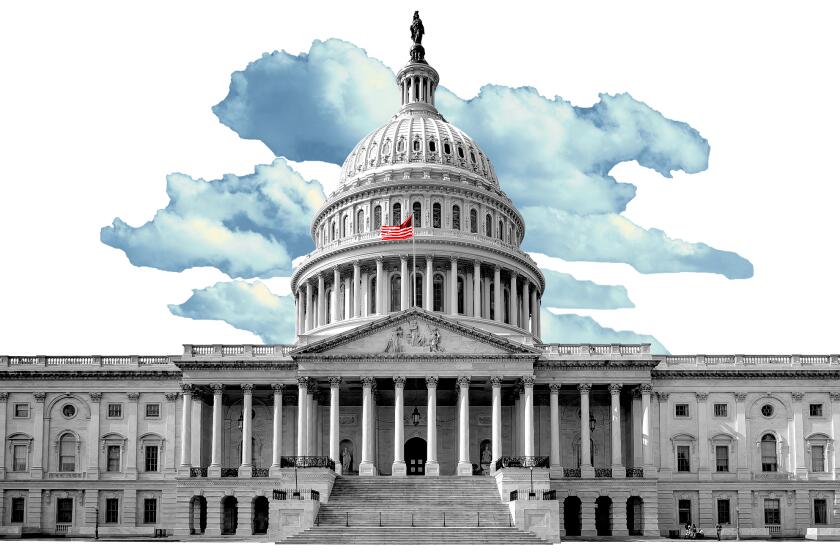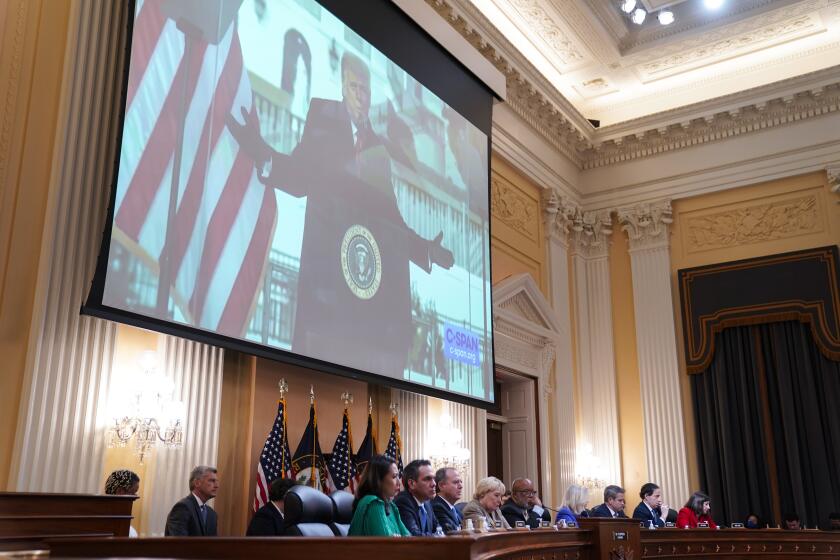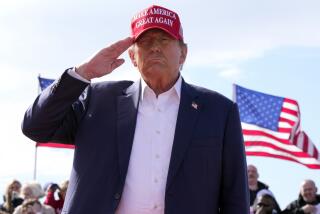Jan. 6 attack on Capitol was the ‘culmination of an attempted coup,’ panel chairman says
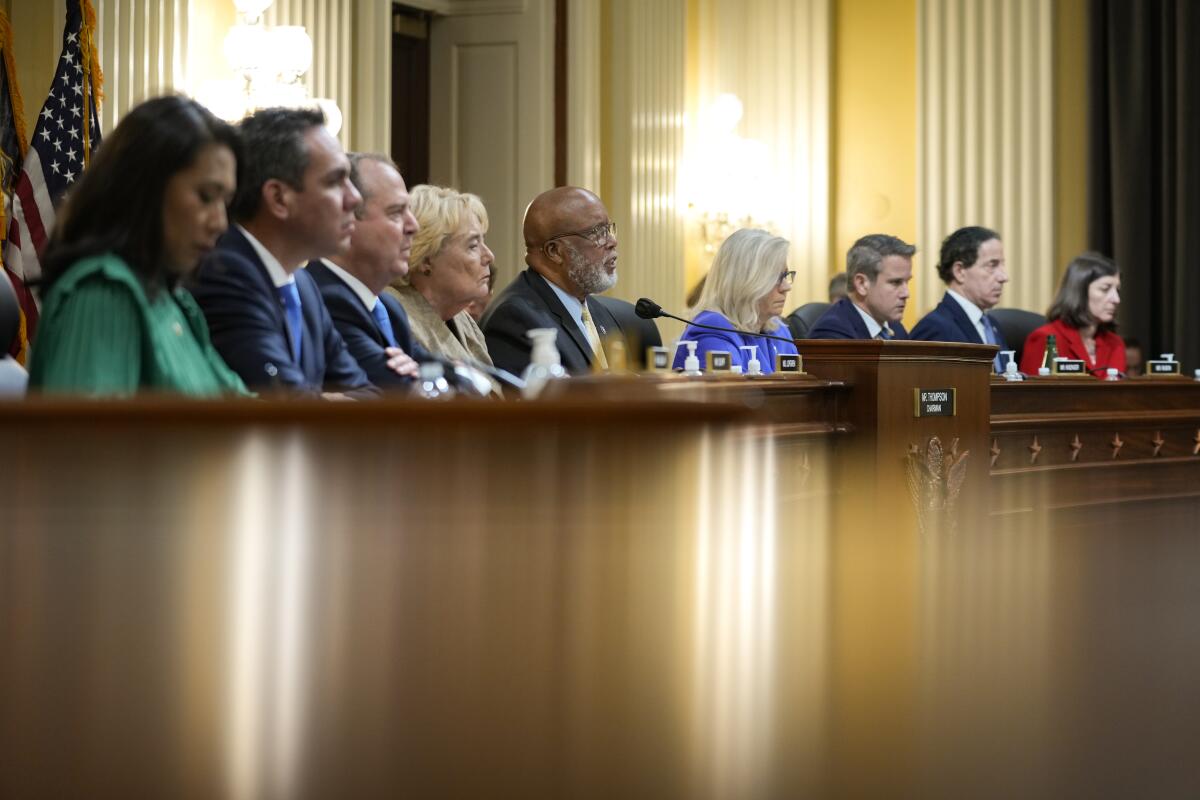
- Share via
WASHINGTON — Americans watching the first Jan. 6 select committee hearing Thursday night were jolted back to the horror of the Capitol attack in early 2021, with the panel deploying never-before-seen video of violence and graphic, emotional testimony from an officer wounded in the melee to place then-President Trump at the center of what House members called a conspiracy to overrule the will of voters.
“President Trump summoned the mob, assembled the mob and lit the flame of this attack,” committee Vice Chair Liz Cheney (R-Wyo.) said at the hearing, which highlighted a 10-minute video montage of the Jan. 6, 2021, insurrection as well as recorded depositions of those closest to the former president.
The hearing included bombshell allegations that Cheney said the committee will corroborate during subsequent hearings to prove a coordinated effort to stop certification of the 2020 presidential election and keep Trump in office.
Committee Chairman Bennie Thompson (D-Miss.) called Jan. 6, 2021, “the culmination of an attempted coup.”
“We can’t sweep what happened under the rug,” Thompson said in his opening remarks. “The American people deserve answers. So I come before you this evening not as a Democrat, but as an American who swore an oath to defend the Constitution. The Constitution doesn’t protect just Democrats or just Republicans. It protects all of us: ‘We the People.’ And this scheme was an attempt to undermine the will of the people.”
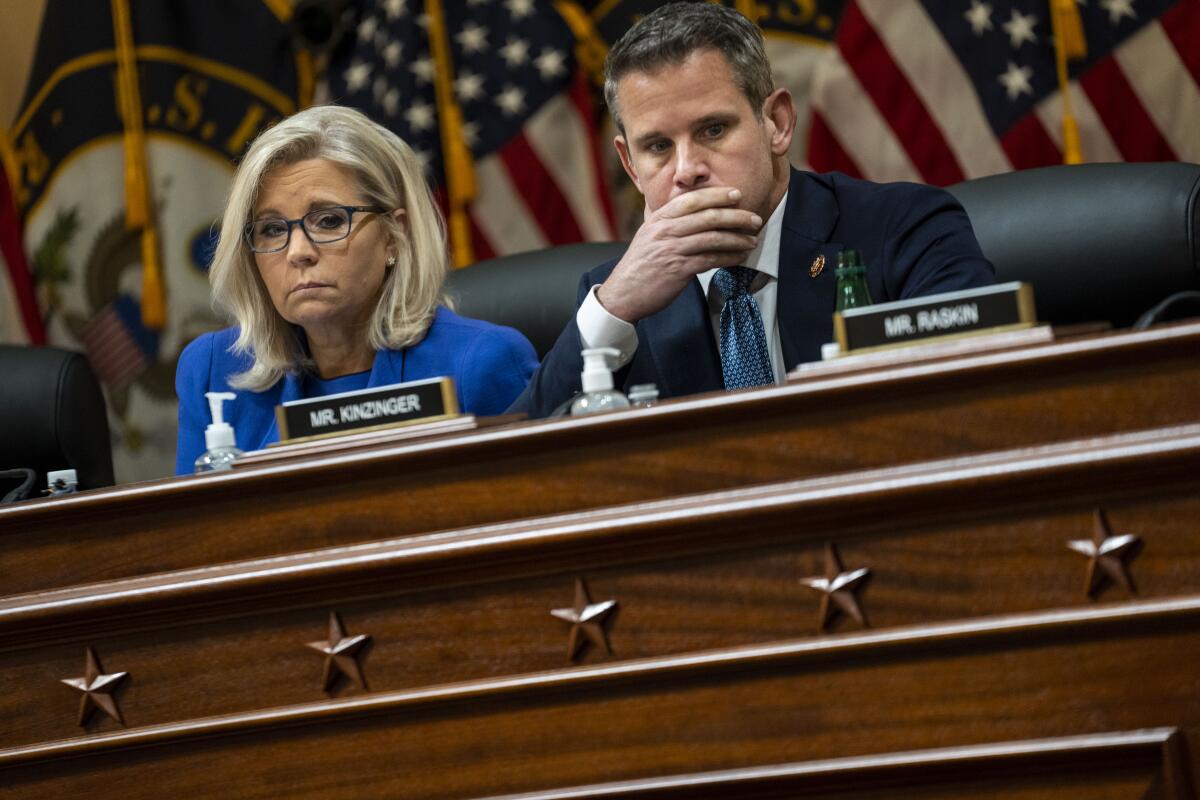
Thompson and others on the panel have stressed that the hearings will not only cover the insurrection at the Capitol a year and a half ago, but also address what can be done to keep similar events from happening in the future.
“Our democracy remains in danger. The conspiracy to thwart the will of the people is not over. There are those in this country who thirst for power but have no love or respect for what makes America great: devotion to the Constitution, allegiance to the rule of law, our shared journey to build a more perfect union,” Thompson said.
The two-hour hearing, which took place in prime time after more than 10 months of investigation behind closed doors, marks the committee’s initial report to the public, and is expected to be followed by at least five more hearings this month.
After the panel played previously unseen footage of the attack, Thompson called a 10-minute recess. Many audience members remained in their seats, looking stunned.
In the hallway outside the committee room, Rep. Pramila Jayapal (D-Wash.) told reporters “that is the most shocking thing, that a president could try to steal an election and incite an insurrection.”
During the two-hour televised event, the committee shared unseen footage of Trump allies contesting the former president’s unfounded assertion that the 2020 election was stolen. A Capitol Police officer also provided vivid details of her bloody battle against insurrectionists.
“There was so many moments when I just was shaking my head,” Jayapal said, near tears. “I felt this deep anger, then this incredible sadness.”
One of the most captivating moments of the hearing came during the testimony of Caroline Edwards, a Capitol Police officer and the first law enforcement officer injured by the rioters. She suffered a traumatic brain injury while trying to stop those who participated in the attack from breaking through the first barricade.
The committee showed video of Edwards and other officers being pushed back with bike racks when Edwards’ chin clipped a handrail, and her head connected with a concrete step. Rioters stepped over her body to surge forward. When she regained consciousness, Edwards ran to help colleagues trying to fend off rioters and was tear-gassed. She recalled slipping in blood while engaging in hours of physical conflict and described the West Front of the Capitol as a “war zone.”
“It was carnage. It was chaos,” she said.
“I’m not combat-trained. And that day it was just hours of hand-to-hand combat.”
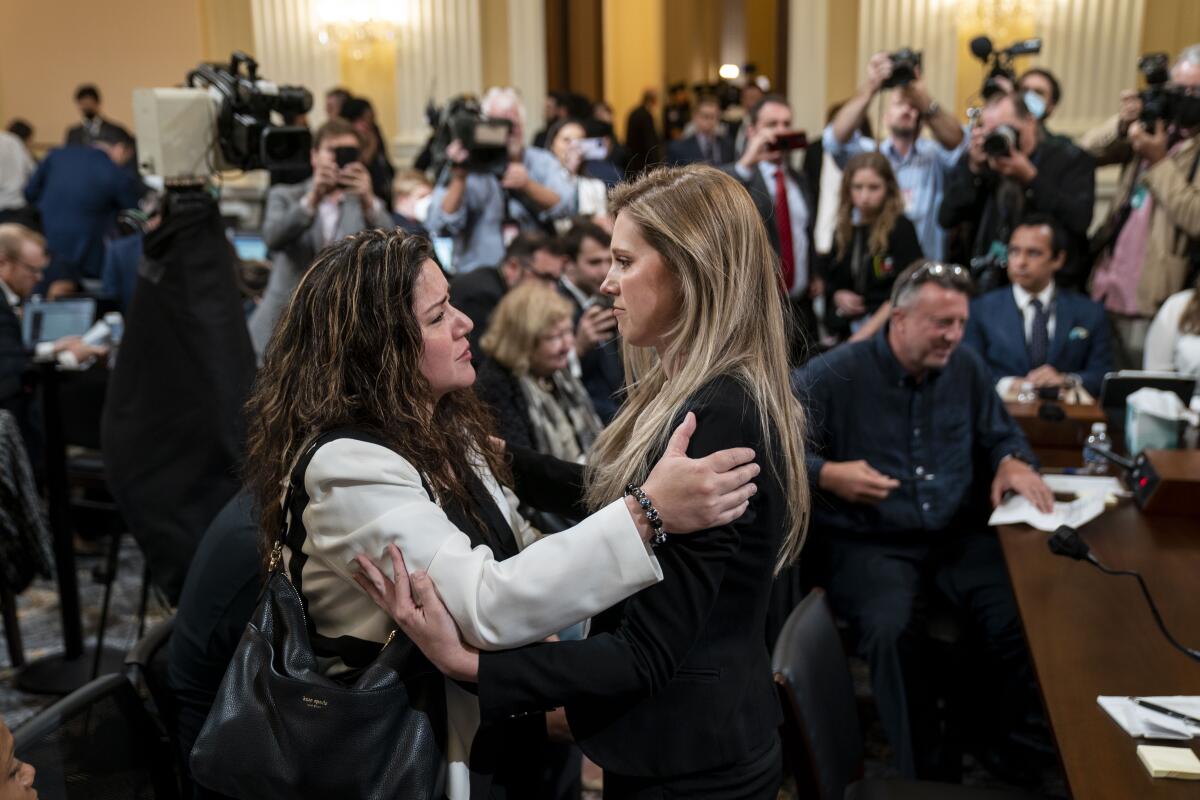
Preferring substance over spectacle, real emotion over grandstanding, the first night of the Jan. 6 hearings successfully grabbed America’s attention.
In her testimony, Edwards, who still hasn’t been cleared to return to work, called herself “the proud granddaughter of a Marine” who fought in the Korean War. She spoke about all the names she was called during the attack and the sense of duty she felt to protect the Capitol.
“They dared to question my honor,” she said. “They dared to question my loyalties. And they dared to question my duty.
“I’m a proud American, and I will gladly sacrifice everything to make sure that the America my grandfather defended is here for many years to come with you.”
Before closing out the hearing, Cheney laid out the next two weeks of testimony and other evidence to be presented to the public.
Monday’s hearing will focus on evidence that Trump was informed multiple times by his campaign staff and Atty. Gen. William Barr there was no credible proof of fraud. Cheney showed video of Barr saying he “repeatedly told the president in no uncertain terms I did not see evidence of fraud that would have affected the outcome of the election. And frankly, a year and a half later, I haven’t seen anything to change my mind on that.” She also showed footage of the former president’s daughter, Ivanka Trump, saying she agreed with Barr.
Wednesday’s hearing will address Trump’s pressure on the Justice Department to claim rampant fraud in the election and his attempt to install a person as attorney general who would help him in that effort. Trump was stymied by threats from the leadership of the Justice Department and all of the White House lawyers to resign en masse. Cheney said Rep. Scott Perry (R-Pa.) was part of that effort.
The prime-time hearing came after a yearlong investigation and 1,000 interviews. The final report aims to provide an accounting of the most violent attack on the Capitol since the British-set fire in 1814.
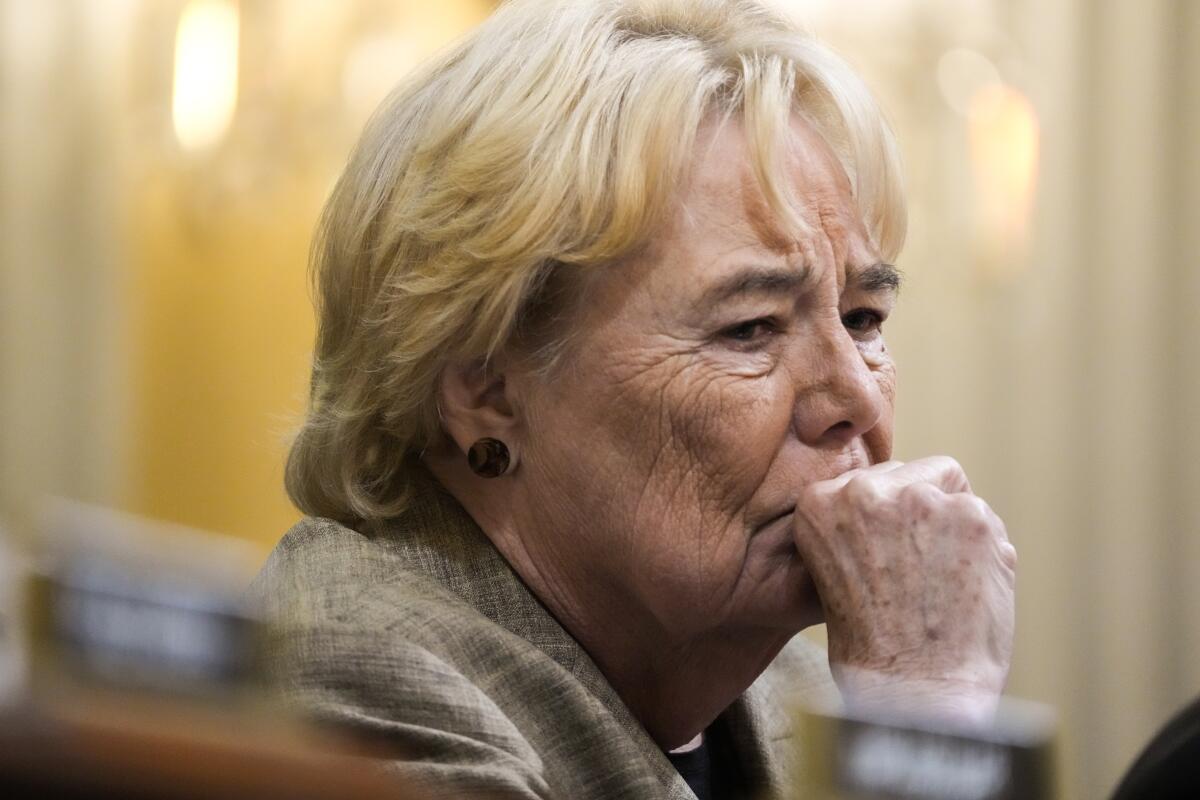
“As you will see, Rep. Perry contacted the White House in the weeks after Jan. 6, to seek a presidential pardon. Multiple other Republican congressmen also sought presidential pardons for their roles in attempting to overturn the 2020 election,” Cheney said.
When asked after the hearing, committee member Rep. Jamie Raskin (D-Md.) wouldn’t say which other lawmakers sought preemptive pardons for their involvement in the events of Jan. 6, and declined to share if those names will be revealed at a future hearing.
“I’m not even revealing what we’re revealing,” he said, signaling the suspense that the select committee members hope to maintain throughout the process.
Later the committee will lay out the pressure campaign conducted by Trump allies to persuade states to rescind certified results, including evidence that Trump asked Georgia election officials to find enough votes to allow him to win the state.
Another hearing will be dedicated to the pressure placed on Vice President Mike Pence by Trump and California lawyer John Eastman to reject the votes of certain states or send the results back to the states, and will include testimony from the judge who helped Pence decide not to cave to Trump’s demands.
The committee will also present evidence, Cheney said, that Trump’s rhetoric summoned a violent mob and directed extremists to the Capitol, and show that he later did not speak with military leaders trying to get control of the situation and took several hours to call for the rioters to leave.
That hearing will feature a minute-by-minute recounting of Trump’s actions during the attack from more than a half-dozen White house staff and administration officials.
Cheney said at Thursday’s hearing that Trump grew angry with advisors pleading with him to do something. Aware of the rioters’ chants to “hang Mike Pence,” Cheney said the president responded with this sentiment: “‘Well, maybe our supporters have the right idea. Mike Pence,’ quote, ‘deserves it.’”
House Republicans chose not to officially participate on the Jan. 6 committee because Speaker Nancy Pelosi (D-San Francisco) rejected two representatives whom House Minority Leader Kevin McCarthy (R-Bakersfield) recommended to serve on the panel whom she considered hostile to its mission. Pelosi asked Cheney and Rep. Adam Kinzinger (R-Ill.) to serve so the committee would be bipartisan and have a quorum.
The Jan. 6 hearing showed how pro-Trump Capitol rioters nearly succeeded in overthrowing the government.
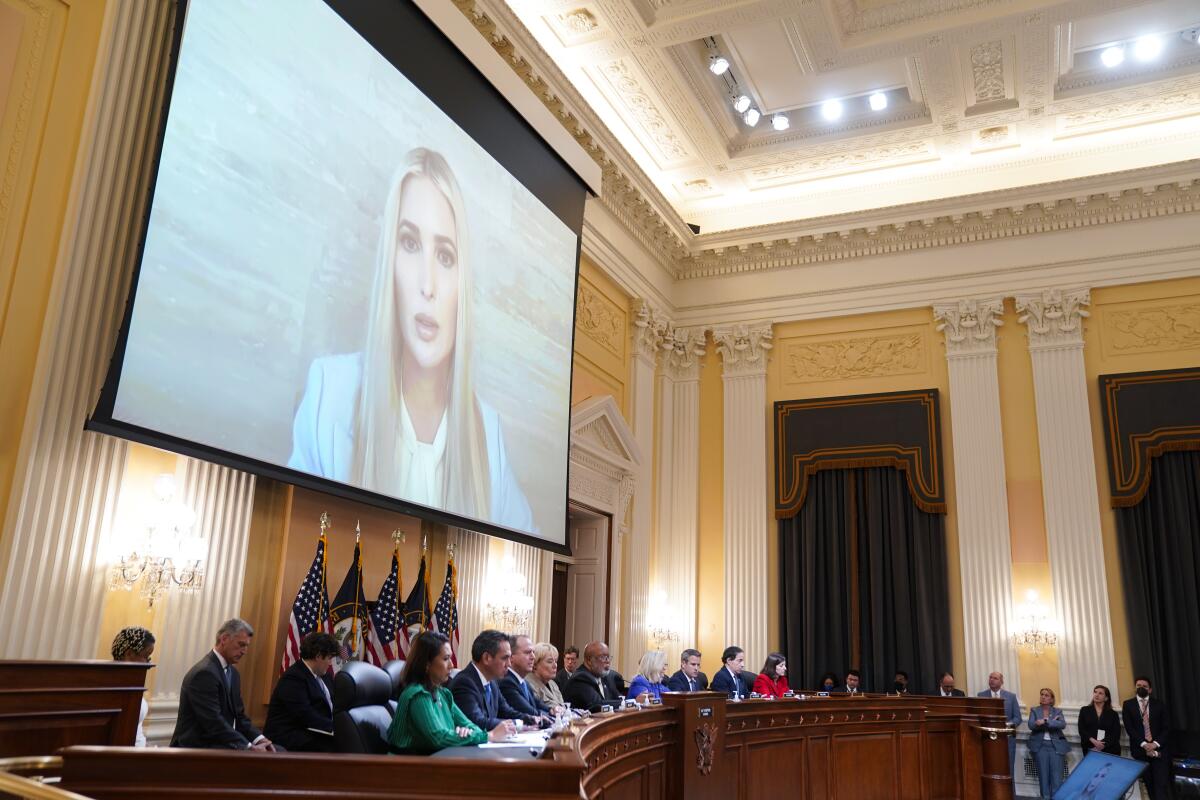
is presented at Thursday’s hearing.
Republicans have criticized the panel on social media and in television interviews, rather than pushing back in person on assertions made inside the hearing room. Hours before Thursday’s hearing began, the Republican National Committee called it a “prime-time political circus.”
Rep. Rodney Davis (R-Ill.), the highest-ranking Republican on the committee that oversees House functions, said Thursday that if the GOP regains control of the House, one of the party’s first priorities will be to investigate Pelosi and the Jan. 6 committee.
Trump also responded to the hearing Thursday night in a post on Truth Social, the social media platform he founded following his ban from Twitter.
“So the Unselect Committee of political HACKS refuses to play any of the many positive witnesses and statements, refuses to talk of the Election Fraud and Irregularities that took place on a massive scale, and decided to use a documentary maker from Fake News ABC to spin only negative footage,” Trump said. “Our Country is in such trouble!”
But Cheney, who was stripped of her role leading the Republican conference and sanctioned by the Republican National Committee for criticizing Trump’s actions on Jan. 6, issued a warning at the hearing to her colleagues who have stood alongside Trump and downplayed the attack.
“There will come a day when Donald Trump is gone,” she said. “But your dishonor will remain.”
More to Read
Get the L.A. Times Politics newsletter
Deeply reported insights into legislation, politics and policy from Sacramento, Washington and beyond. In your inbox twice per week.
You may occasionally receive promotional content from the Los Angeles Times.
